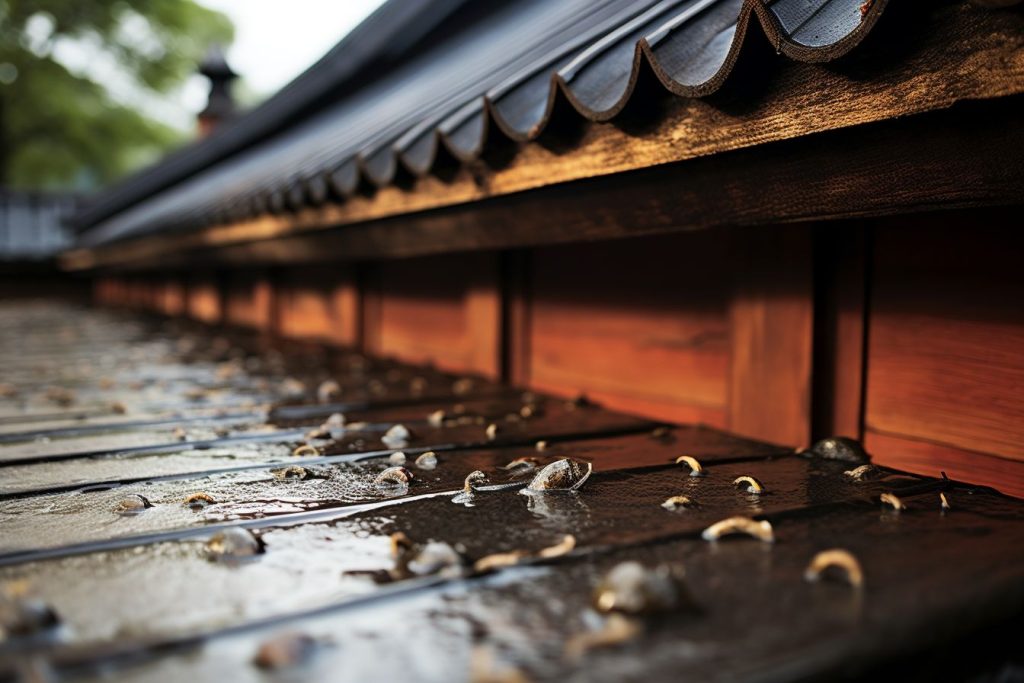Many homeowners are curious: how long does roof waterproofing genuinely last? Believe it or not, basic waterproofing membranes can withstand up to a decade of use! This blog dives into the factors contributing to the durability of your roof waterproofing, giving you insider knowledge on how to get the most out of your investment.
Ready for some enlightening facts about preserving your home’s ultimate shield? Let’s dive in!
Key Takeaways
- Roof waterproofing can last 10 to 30 years, depending on the materials’ quality and regular maintenance.
- Factors that affect the longevity of roof waterproofing include the quality of the waterproofing membrane, workmanship during installation, and regular preventative maintenance.
- High-quality materials and proper installation techniques are essential for extending the lifespan of roof waterproofing.
- Regular inspections, cleaning gutters, trimming overhanging branches, applying UV protectant coating, and addressing leaks promptly can help maximize the longevity of roof waterproofing.
The Ultimate Guide to Roof Waterproofing
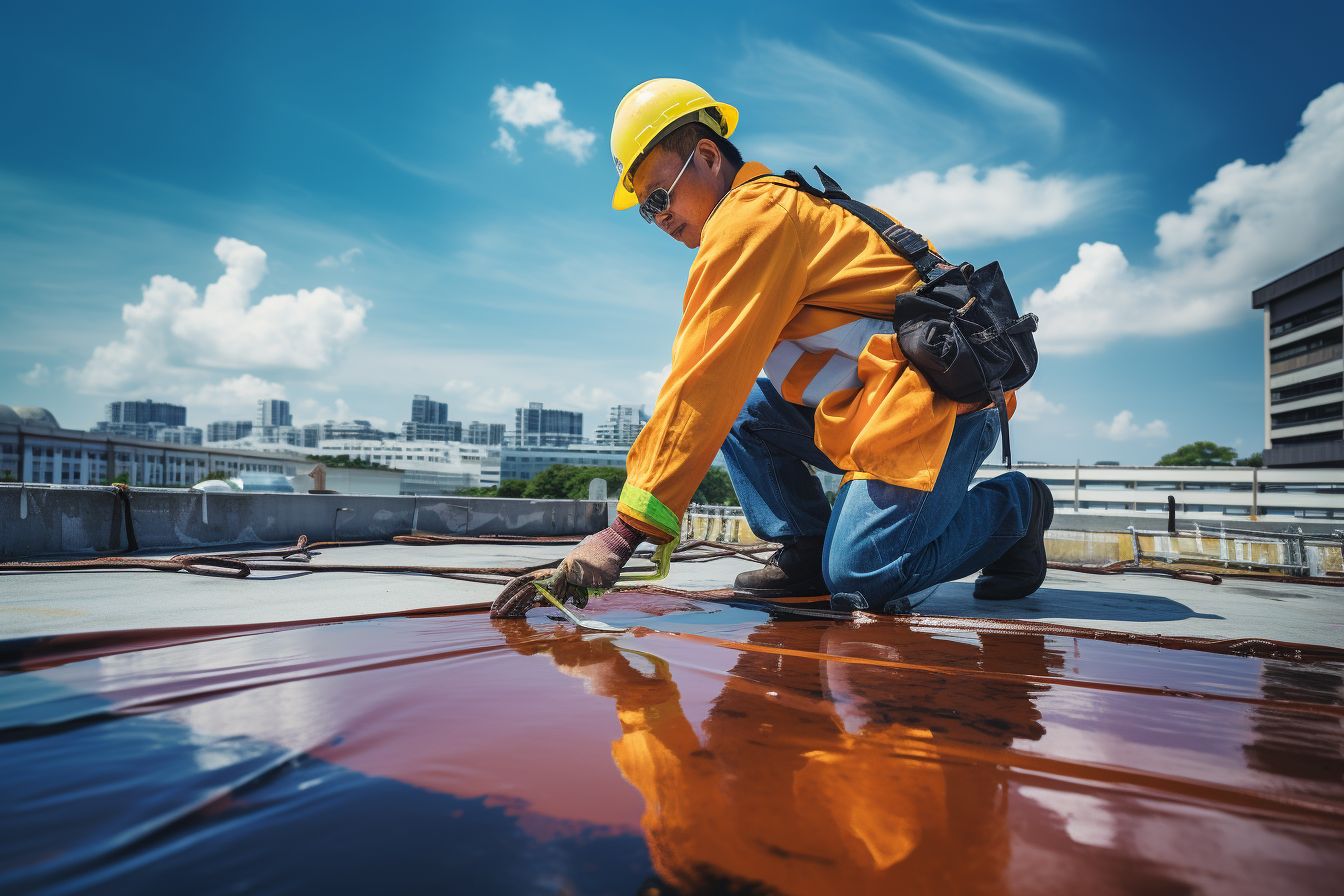
Roof waterproofing is a significant step in rooftop protection. It requires careful waterproof coating and uses various materials to achieve optimal results. The primary goal is to prevent water from penetrating the roof, thus reducing damage such as leaks and structural decay.
Depending on the type and quality of the sealant used, its lifespan can range between 20 to 40 years.
Appropriate installation greatly influences how long a waterproofed roof can last. Skilled workmanship leads to more reliable results, while poor construction procedures might reduce effectiveness drastically.
On average, concrete sealer for a residential house’s concrete roof lasts about five years before reapplication becomes necessary. At commercial buildings where advanced techniques are applied due to their larger scale, the situation could be different but just as crucial.
Liquid-based solutions are often favored for flat roofs owing to their ease of application and reapplication when needed. Maintenance plays an equally important role in prolonging this period – a well-cared-for rooftop has fewer chances of wear-out or damage over time than those lacking regular upkeep.
In addition to maintenance efforts, understanding your specific needs is key when choosing suitable waterproofing materials for your property’s unique requirements, such as climatic conditions or surrounding environmental factors that may affect longevity differently.
Other essentials like correct drainage systems should not be overlooked since they go hand-in-hand with successful roofing project outcomes.
Factors that Affect the Longevity of Roof Waterproofing
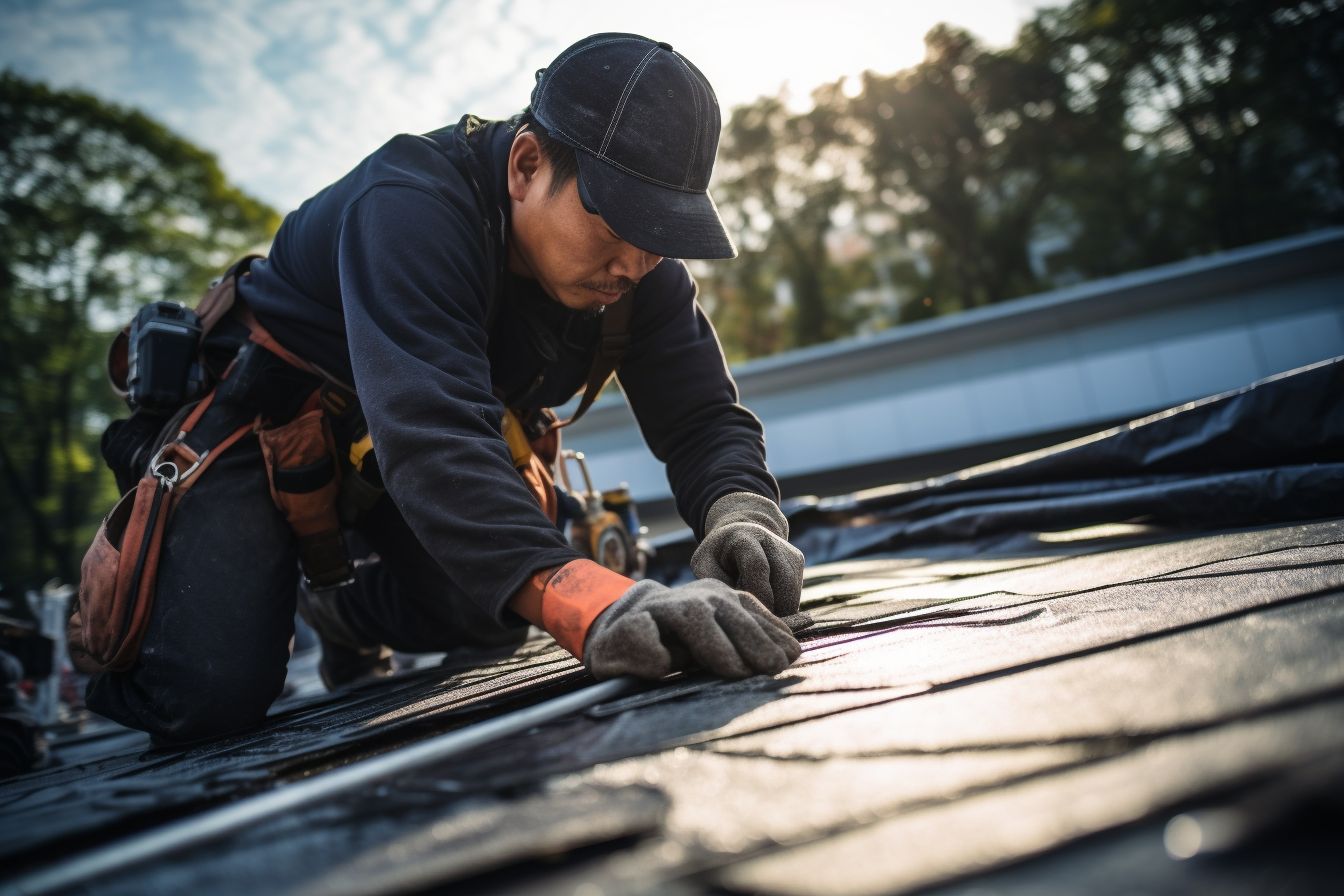
The quality of the waterproofing membrane, workmanship during installation, and regular preventative maintenance all play a significant role in determining how long roof waterproofing will last.
Quality of the waterproofing membrane
The quality of the waterproofing membrane plays a critical role in determining the lifespan and integrity of roof waterproofing. Various membranes exist on the market, with different properties designed for unique climates and building types.
For instance, PVC-P waterproofing membranes are popular but can degrade over time because of dehydrochlorination, affecting their durability.
Selecting high-quality materials is beneficial to extend the life span and enhance waterproofing integrity, reducing risks like mildew growth and costly repair bills.
Liquid membrane waterproofing is another viable option that offers elasticity and strong adhesion to surfaces, providing an impermeable seal against water penetration. Both material choice and technical specifications significantly impact a project’s long-term success.
Workmanship during installation
Proper application techniques are pivotal for effective waterproofing and the longevity of a roof. High workmanship standards ensure the waterproofing membrane is correctly applied, significantly boosting its effectiveness and durability.
However, poor workmanship can lead to improper application, compromising the intended function of the waterproofing membrane. Consequently, correct installation methods greatly enhance roofing longevity and ensure overall successful roof waterproofing.
Regular preventative maintenance
Regular preventative maintenance is essential for the longevity of roof waterproofing. Regular inspections and promptly addressing any issues can prevent minor problems from turning into expensive repairs or premature roofing failure.
Regular maintenance also helps improve indoor air quality by preventing water infiltration and mold growth. Taking proactive measures such as cleaning gutters, removing debris, and scheduling professional roof inspections can significantly extend the lifespan of your roof waterproofing.
Don’t neglect this important aspect of maintaining your roof and protecting your investment in your property.
Average Lifespan of Roof Waterproofing
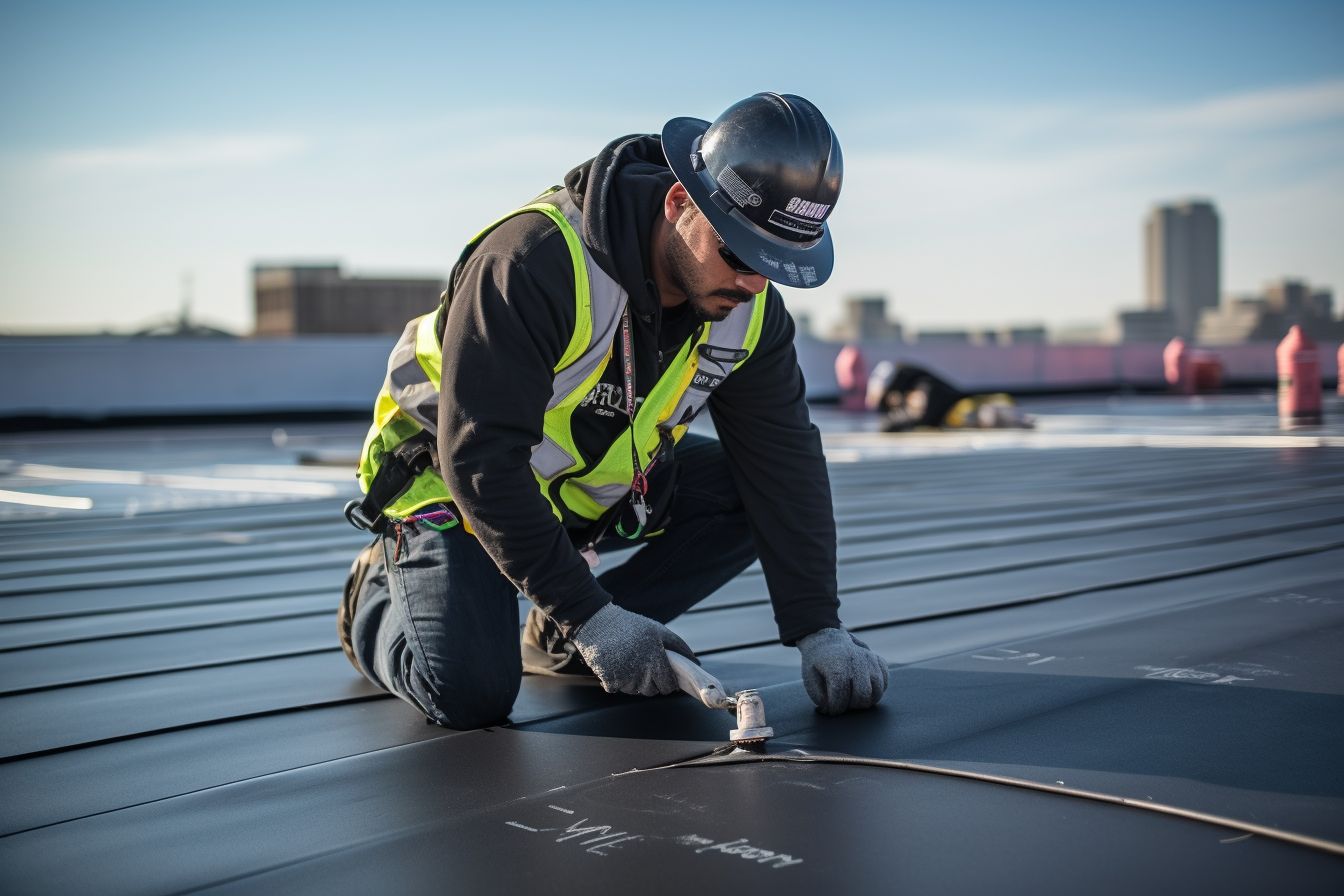
Roof waterproofing materials have different average lifespans, depending on the type and quality of the materials used. On average, a high-quality waterproofing system should last 10 years.
Waterproofing membranes, commonly used in many roofs, typically have a 20-30-year lifespan. For those considering green roofs, the membranes used can have an even longer lifespan of 30-50 years.
Alternatively, elastomeric roof coatings protect for about 10-20 years before needing to be replaced. Choosing the right type of roofing material is essential, and regularly maintaining it to extend its lifespan as much as possible.
Overall, understanding the average lifespan of different roof waterproofing options is crucial when planning for maintenance and replacements in the future. By knowing how long various materials are expected to last, homeowners can make informed decisions that will save them time and money.
Tips for Extending the Lifespan of Roof Waterproofing
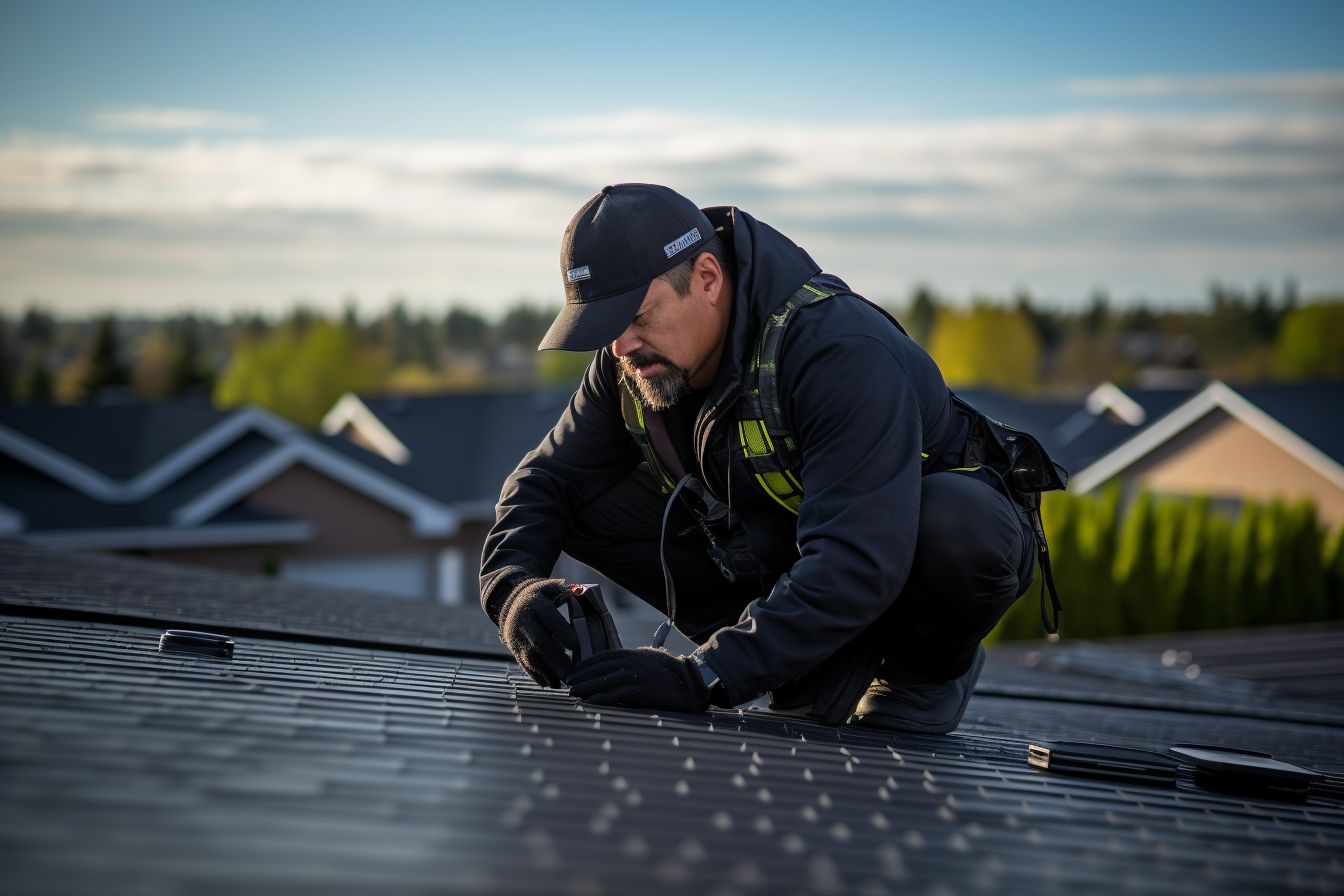
To extend the lifespan of your roof waterproofing and prevent water damage, try implementing these tips:
- Conduct regular inspections to identify any signs of wear or damage.
- Clean your gutters and downspouts regularly to ensure proper drainage.
- Trim overhanging tree branches to prevent debris accumulation on the roof.
- Apply a UV protectant coating to shield the waterproofing membrane from sun damage.
- Address any leaks or issues promptly by contacting a professional roofing contractor.
Conclusion
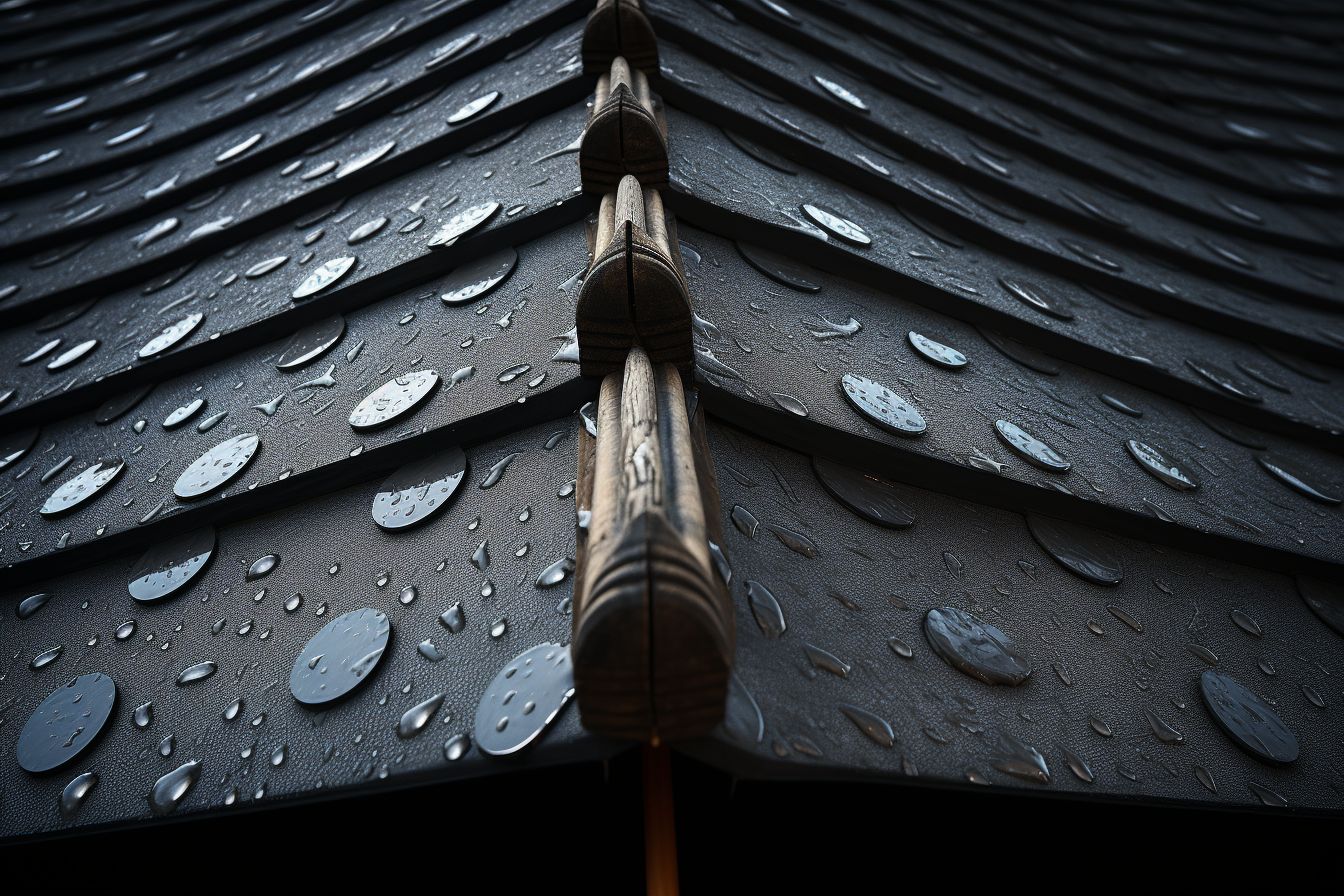
Roof waterproofing can last anywhere from 10 to 30 years, depending on factors such as the materials’ quality and regular maintenance. The lifespan can be extended by choosing high-quality systems and membranes.
Considering these factors when planning for roof maintenance and ensuring long-lasting protection against water damage is essential.
FAQs
1. How long does roof waterproofing typically last?
Roof waterproofing can last anywhere from 5 to 20 years, depending on the type of material used and environmental factors.
2. What factors can affect the lifespan of roof waterproofing?
Factors such as weather conditions, exposure to UV rays, maintenance practices, and the quality of installation can all influence how long roof waterproofing lasts.
3. Can I extend the lifespan of my roof waterproofing?
Yes, regular inspections and maintenance can help prolong the life of your roof waterproofing. Prompt repairs when needed and keeping gutters clean are essential for its longevity.
4. When should I consider reapplying roof waterproofing?
If you notice signs of water damage or leaks in your home’s interior or it has been over a decade since your last application, it may be time to reapply roof waterproofing.
5. Is it possible to apply new layers over existing roof waterproofing?
In some cases, additional layers of roof waterproofing can be applied over existing ones, but consulting with a professional is recommended for proper assessment and guidance based on your specific situation.

